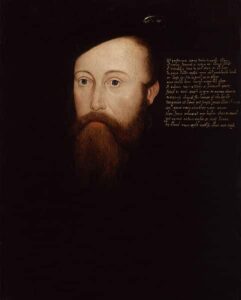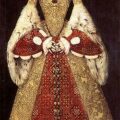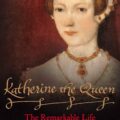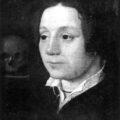
He had been causing the King’s Council concern for some time, but it was the alleged plot to kidnap the young King Edward VI, his nephew, in January 1549 which led to his execution. On the night of the 16th January 1549, Seymour had broken into the King’s apartments at Hampton Court Palace and had shot the King’s beloved pet Spaniel after it barked at him. He was arrested, charged with treason and executed on the 20th March 1549 after the King had signed his death warrant.
In her book, “Katherine the Queen: The Remarkable Life of Katherine Parr”, historian Linda Porter, writes of how Seymour died with dignity and courage and that it took two blows of the axe to sever his head. During his imprisonment in the Tower of London, Seymour wrote the following poem:-
“Forgetting God
to love a king
Hath been my rod
Or else nothing:
In this frail life
being a blast
of care and strife
till in be past.
Yet God did call
me in my pride
lest I should fall
and from him slide
for whom loves he
and not correct
that they may be
of his elect
The death haste thee
thou shalt me gain
Immortally
with him to reign
Who send the king
Like years as noye
In governing
His realm in joy
And after this
frail life such grace
As in his bliss
he may have place.”1
David Starkey writes of how unpopular Seymour’s execution was and both Porter and Starkey write of how the King’s Council had to take steps to calm the situation by blackening Seymour’s name. The Council spread it around that Seymour had written letters to Mary and Elizabeth encouraging them to rise up against their brother’s government and Hugh Latimer, the cleric who had been friends with Seymour and who had had Seymour as his patron, preached a sermon vilifying Seymour and accusing him of being an atheist, traitor and debaucher of women:-
“He was, I heard say, a covetous man:…I would there were no more in England. He was, I heard say, an ambitious man: I would there were no more in England. He was, I heard say, a seditious man, a contemner of common prayer: I would there were no more in England. Well he is gone. I would he had left none behind him.
As touching the kind of his death, whether he be saved or no, I refer that to God only… And when a man hath two strokes of the axe who can tell but that between two strokes he doth repent? It is very hard to judge. Well, I will not go so nigh to work; but this I will say if they ask me what I think of his death, that he died very dangerously, irksomely, horribly… He was a man the farthest from the fear of God that I knew of or heard of in England… surely he was a wicked man and the realm is well rid of him.”2
Nicholas Throckmorton said of Seymour’s end:-
“Off went his head, they made a quick despatch,
But ever since I thought him sure a beast
Who causeless laboured to defile his nest
Though guiltless, he, through malice, went to pot
Not answering for himself nor knowing cause.”3
In other words, “it was other men’s ambitions, as much as the admiral’s, that brought about his downfall”4.
John Harington, Seymour’s servant and friend, wrote of Seymour:-
“Friend to God’s truth, and foe to Rome’s deceit…
Yet against nature, reason and just laws
His blood was spilt, guiltless, without just cause.”5
It is alleged that the 15 year old Elizabeth, on hearing of Seymour’s death, said: “This day died a man of much wit and very little judgement” which Linda Porter says “are a fitting epitaph for one of Tudor England’s most colourful courtiers”. Porter goes on to say that although Seymour was a flawed man, he was also a man who “had served his king and country ably”. He may have become consumed with ambition “yet both Katherine and Elizabeth, two of the most outstanding women of their time, loved him, despite his weaknesses.”6
How is Thomas Seymour viewed today?
In “The Tudors”, we see him sleeping with his brother’s wife and fathering her child (not true!); in fiction Seymour deflowers the young Elizabeth, makes her pregnant and gets rid of his wife, Catherine. We judge him as a sexual predator, preying on the teenage Elizabeth, as the man who broke Catherine Parr’s heart and as a proud and ambitious man who deserved his fall, afterall, pride comes before a fall! However, as I have said before, I choose to see him through the eyes of Catherine Parr and Elizabeth, women who were intelligent and shrewd, and through the eyes of John Harington, a man who knew him well. Also, no scandal surrounded Seymour until his ‘dalliance’ with Elizabeth, he was a man who had made his name at the English Court without sullying his reputation. Perhaps we should give him the benefit of the doubt.
How sad that he lost the steadying influence of his wife when she died in September 1548 and how sad that their daughter, Mary, was left an orphan just a few months after her birth. A tragic story indeed. A story of love, intrigue, pride, ambition, betrayal and death.
What do you think of Thomas Seymour?
Notes and Sources
- John Harington, Nugae Antiquae (London, 1769), vol. 3, p259, quoted in “Katherine the Queen”, Linda Porter, p338
- “Lady Jane Grey: A Tudor Mystery”, Eric Ives, p 48
- Linda Porter, p339
- Ibid.
- Ibid.
- Ibid., p340







What does “noye” mean in Seymour’s poem? I googled it and found it means ‘flood’ in French.
Claire, I know you’re trying to see the best of Thomas Seymour, and add that Catherine Parr and Elizabeth, both strong, intelligent women, loved him.
But isn’t it possible that even the most intelligent and shrewd of women could love a loser? I have known women who were very intelligent, yet married men who were alcoholics, abusers, lazy good for nothings and yet, made all sorts of excuses for the behavior of those men, despite their obvious failings.
Interesting article. I’m not sure what Catherine Parr felt about him after his “play” with Elizabeth. Today, such conduct with a 15 year old entrusted to his care would get Thomas locked up for a species of child molestation. However, I have read that Catherine made statements close to her death that showed how badly she had been hurt. IMO, if Thomas didn’t realize the trouble he was causing for both Catherine and Elizabeth then he must be pretty stupid. Apparently, though, he thought he could get away with shooting Edward’s dog … so he just might have been not overly intelligent.
It was very easy years ago to despise Thomas Seymour, thanks to the sources I had read because there seemed to be NO good in him. If even half of what we know about the incidents with Elizabeth are true, then the man does appear to be a type of predator (and at the very least an adulterer). I know that he was ambitious, but then so was his brother and the latter may have a had a good deal to do with helping to bring about Thomas’ execution. But there must have been something good about him — something that made a young widow (who then had TWO late husbands) fall in love with him…and only the “love” of her King forced her to turn aside what her heart wanted. I guess I could be cynical and say that Thomas only desired to combine his power as a Prince’s uncle and a member of the Council with that of a very wealthy (and somewhat independent) woman, but I want to think that he loved Katherine. Lord knows she loved him. And as we discussed in the past, the incident of the possible kidnapping of Edward may or may not have been accurate. All I know is that if it was necessary for the Council to fabricate evidence to make him appear even more evil, then they didn’t have much evidence in the first place!
I’m still not a Thomas Seymour fan — there’ll ALWAYS be something that gnaws at me about that whole weird summer with him, Katherine and Elizabeth. But he appears no more ambitious and occasionally duplicitous than many other important men in Tudor England…and all thanks to sister Jane catching the King’s eye (I’m still trying to sort HER out thank you very much 😀 LOL). Anyway Claire, thanks for the remembrance of the date.
I’m just trying to give him the benefit of the doubt really. History is written by the victors and Seymour was not one of them and the Council deliberately blackened his name to subdue the outcry over his execution. The fact that his execution was so unpopular points to the fact that even at the end he was a respected and well liked man.
Impish,
“noye” is a pre-standardized spelling of Noah, and the “years” would be the nine hundred and fifty years of Noah’s lifetime as given in Genesis, wishing his nephew, King Edward, a very long reign.
I think if Seymour learned the lessons of Anne Boleyn, Thomas Cromwell and Henry Howard, he would not be executed. He should have known that he was politically surrounded by enemies who were willing to bring him down. He should be careful, not to lose away the king [Edward VI] ‘s love. The evidences about his affair with Elizabeth Tudor were unconvincing, and were only based on rumours (just like the false accusations against Anne Boleyn, Thomas Cromwell and Henry Howard). If he were not found late in the King[Edward VI]’s palace, no one could bring him down. The fact is, Seymour was found late at night in the King’s palace and the King’s beloved dog was found dead. These incidents gave the Privy Council an opportunity to bring about his downfall and execution.
Elizabeth understood the difficulties and dangers of Sexual freedom at the time, the high risk of death as evidenced within her own family — not just from giving birth but from politically incorrect relationships.
She was taken by Thomas seymour at a young age, say 15, it had to be covered up so he , for that and other reasons was killed. She then began to appreciate the “spin” value of virginity – it gave her a platform for Tilbury after all ” I know I have the body of a weak and feeble woman but I have the heart and stomach of a king….. ”
In the male mind, ie. the minds of the troops she was addressing, spinsters are seen as , in some way , weak and feeble.
Elizabeth had lovers ….Dudley and Devereux……. and why shouldn’t she ?
Impish: Noye refers to Noah, who lived for 950 years.
Why aren’t their more books about Tom Seymour,? I think he is a fascinating character. A perfect bad uncle, lover, ambitious man and probably why ELIZABETH never could marry. She discovered that if you were close to the throne that men would be attracted to you because of the power, not because they love you, but because of the power you might hold someday. Women are always looking for the man who loves the person they are, their mind. I think she learned early you can never trust men completely.